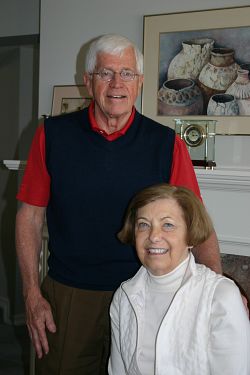Catholic woman's friends rally to find her a kidney
Friday, Feb. 20, 2015

Intermountain Catholic
+ Enlarge
Tom and Shirley Callanan prepare for Shirley's kidney dialysis, hoping for a kidney donor to match so a transplant can take place.
IC photo/Christine Young
SALT LAKE CITY — Shirley Callanan has polycystic kidney disease (PKD) and is in need of a matching kidney donor.
Callanan has been a member of the Catholic Woman’s League for almost 10 years, and serves on its board. Her friends in the CWL have rallied around her to find a donor by telling friends and setting up a Facebook page that has reached more than 3,000 people.
“Shirley is a very dear friend of mine and she is such a model of faith,” said Cece Holt, a longtime member of the CWL. “To look at Shirley, she is the epitome of good health, thanks to good nutrition and her commitment to daily exercise.”
Callanan and her husband, Tom, are members of the Cathedral of the Madeleine, and Tom is president of the Catholic Community Services board of directors.
The appeal for a donor started three weeks ago when Callanan’s doctor told her that it was time to start kidney dialysis; her kidney function is 5 percent and it should be 85 percent.
Callanan was diagnosed with PKD in 2009. PKD is an inherited disorder in which clusters of cysts develop primarily within the kidneys, resulting in reduced kidney function, which leads to kidney failure.
“My father died of PKD when he was 46, and his mother died of kidney disease in her early 60s,” said Callanan. “My sister also had PKD at age 60, and had a transplant five years ago. Our cousin was her donor; they are both doing well. Oddly, my mother lived to be almost 101.”
PKD causes high blood pressure, a symptom Callanan has had for 33 years. “My father had high blood pressure, so we were watching mine and slowly my kidney function declined,” she said.
PKD affects both kidneys; typically the onset of the disease comes between the ages of 50 and 60; Callanan is 68. The cause of the disease is unknown; there is no cure and treatment options are dialysis or a transplant.
A number of people have been screened as donors for Callanan, but so far she hasn’t been notified that there is a match.
“I would like to be a donor,” said Tom, but his blood type is incompatible with his wife’s.
The couple’s two children cannot be donors because they may carry the PKD disease.
“Having PKD, I worry about my children, my two grandchildren and my husband,” said Callanan. “I also worry about facing dialysis – it is so time consuming and I am active. I knew dialysis was in my future, but hearing it was so hard to take. I exercise six days a week and I work two days a week at the Madeleine Choir School.”
Callanan and her husband have attended a class to find out her options for dialysis at home, which will take nine hours a day, or at a dialysis center for four hours, three days a week.
“Fortunately, I have a lot of friends who have been and are very supportive,” Callanan continued. “I don’t feel that sick, but my doctor keeps telling me ‘until you have a transplant, you won’t realize how sick you are.’”
Callanan, who has been volunteering in the Madeleine Choir School advancement office since 2001, “is a dedicated volunteer and an alumni parent,” said Matt Kitterer, the school’s director of advancement. “Her time and efforts have been key to the success and growth of the Choir School over the last decade and we want to do everything we can to help Shirley and her family.”
“Shirley has asked for our prayers and particular support, and while this may seem like an unusual request, her doctors have encouraged her to proactively seek possible transplant donors,” said Gregory Glenn, Madeleine Choir School pastoral administrator and middle school theology teacher.
If Callanan doesn’t find a donor herself, she may have to wait longer for a kidney on the transplant list. The United Network for Organ Sharing changed the policy for how kidneys are distributed in December 2014. The new policy matches the age of the donor with the age of the recipient to maximize the use in years of the kidney.
“It is our fear that younger recipients will receive kidneys before those who are my age,” said Callanan.
“In Utah there are 506 people waiting for kidneys; 119 are 65 and older,” said Dixie Madsen, Intermountain Donor Services Public Relations and Public Education supervisor. Kidneys are one organ that can be donated as a living donor, and that is one way to help somebody in need and reduce the waiting list.”
To pursue transplant screening for Shirley Callanan, contact Becky Mickelson, Transplant Services Donor Assistant, Intermountain Medical Center, 801-507-8319, or becky.mickelson@imail.org. The process is confidential.
For questions, comments or to report inaccuracies on the website, please CLICK HERE.
© Copyright 2025 The Diocese of Salt Lake City. All rights reserved.
© Copyright 2025 The Diocese of Salt Lake City. All rights reserved.

Stay Connected With Us